In a relatively unsafe world, the last thing we all need is for some unstable country or group to get hold of weapons of mass destruction (WMD) and, worse still, threaten another country or group of people with them. Or, in the worst case, use them. Responsible governments (and, in all honesty, some may be less responsible than others) have long made an effort to prevent WMD falling into the wrong hands. What does that mean? The Financial Action Task Force (FATF), set up as a G7 initiative in 1989, specifically to prevent such things, defines proliferation of weapons of mass destruction (WMD) as “the transfer and export of nuclear, chemical or biological weapons, their means of delivery and related materials.” Sounds pretty clear-cut, but we have to bear in mind that it’s not only the weapons themselves that are covered but also every tiny part that could conceivably go towards their construction. Stopping the transfer of such small and ambiguous bits and pieces is far harder. When I say ‘ambiguous’ it is because many of them may have some other, quite legitimate, even peaceful use in mobile phone technology, the broadcast industry or your children’s latest high-tech toy.
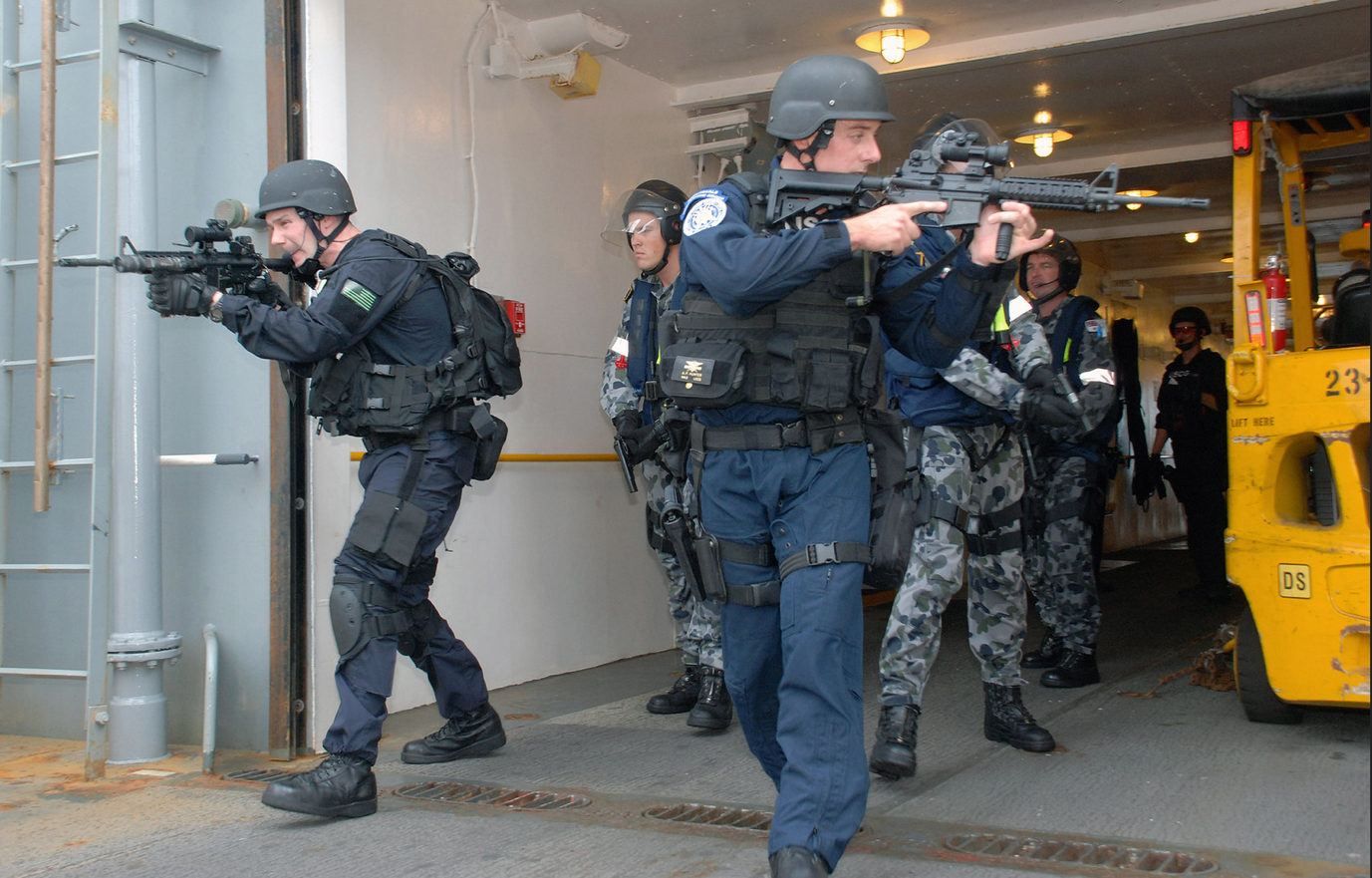 Members of a joint U.S. and Australian navy boarding team conduct a security sweep during a boarding exercise in the South China Sea as part of a Proliferation Security Initiative (PSI) DoD photo
Members of a joint U.S. and Australian navy boarding team conduct a security sweep during a boarding exercise in the South China Sea as part of a Proliferation Security Initiative (PSI) DoD photo
Of late, we’ve been seeing a massive global rearmament programme that should really please nobody except the shareholders of the military-industrial companies, against whom former President Dwight D. Eisenhower warned. “This world in arms is not spending money alone,” he said in Washington in 1953, “It is spending the sweat of its labourers, the genius of its scientists, the hopes of its children.” This may well be true, but those same shareholders are rubbing their hands in gleeful anticipation, all the same. Meanwhile, regimes around the world are looking for ways to strengthen their arsenals against perceived foes. Some of them, if successful, are so unstable that they are likely to use them, whether or not they’re provoked. They tend to see every country and group that does not support their world view as a foe anyway. We already have Russia boasting of its hypersonic weapons, such as the Avangard missile, capable of flying at twenty-seven times the speed of sound and described by a Canadian expert as “unstoppable”, at least for now. Not surprisingly, this makes other countries uneasy and encourages them to develop their own super-weapons. The US has already tested an unarmed prototype of a hypersonic missile, although reaching only Mach-5, it’s not as fast as Russia’s Avangard. It’s still pretty speedy, though. In its fiscal 2021 budget, the US Defence Department requested US$3.2-billion (€2.97-billion) for hypersonic programmes, up from US$2.6 billion (€2.4-billion) in the current year. “Delivering hypersonic weapons is one of the department’s highest technical research and engineering priorities,” the Pentagon said.
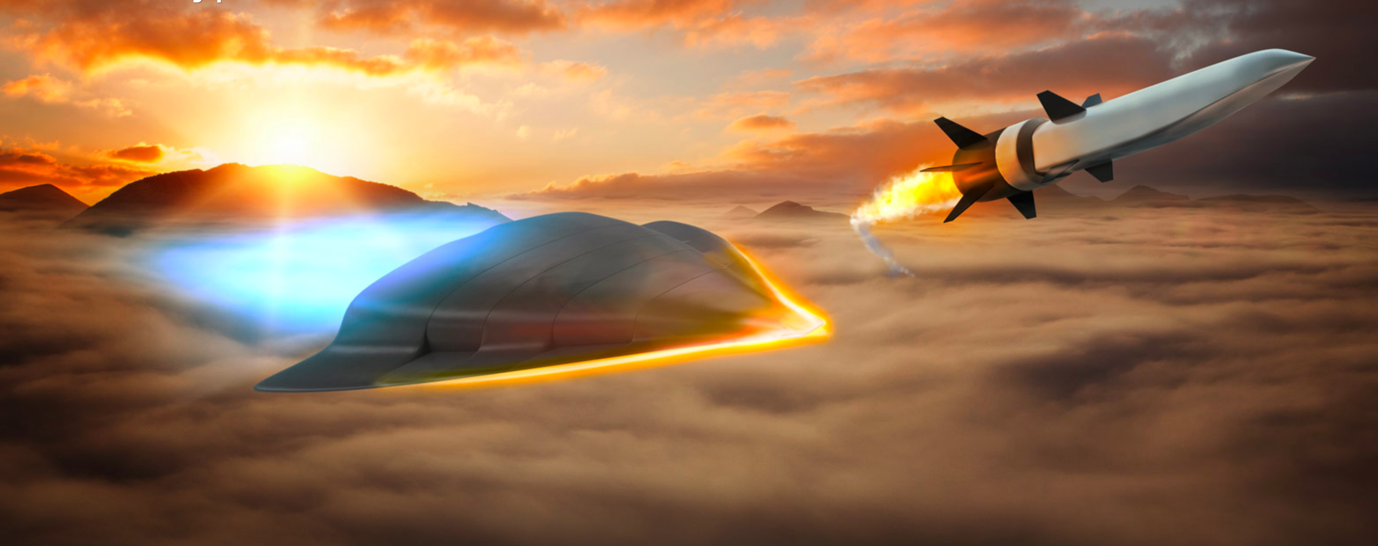 Artist rendering of hypersonic weapons © raytheonmissilesanddefense.com
Artist rendering of hypersonic weapons © raytheonmissilesanddefense.com
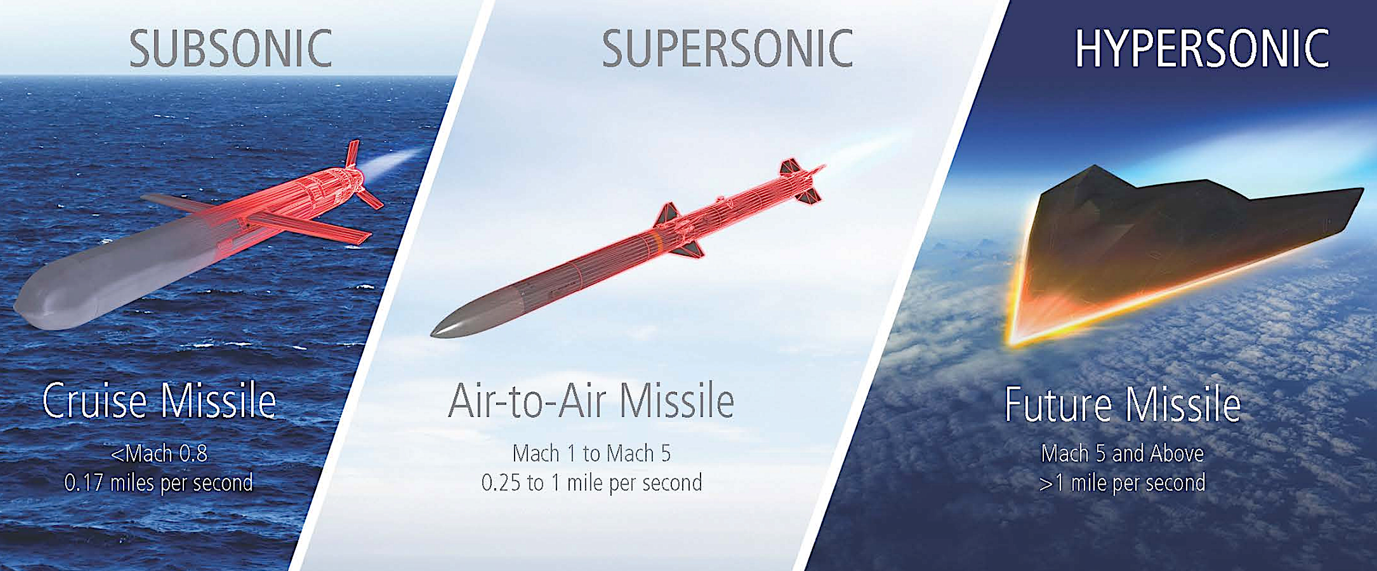
Where weapons of mass destruction are concerned, rumours and conjecture don’t help, although they are inevitable, especially in the wilder areas of sensationalist media and public imagination. On-line social media sites in India are already claiming that the corona virus was developed in Chinese military laboratories as a biological weapon, and I have heard the same rumour being spread and talked about in the United Kingdom. Indian internet sites are full of anti-foreigner propaganda, however, especially since Narendra Modi’s Hindu Nationalist party’s most recent election victory, some attracting literally millions of hits. Modi’s supporters rioted during a visit by President Donald Trump, attacking Muslims because of centuries old religious hatreds, the kind that led to India being divided when the country gained its overdue independence. But while some people with extreme and – let’s be honest – racist views spread malicious and fairly obviously nonsensical scare stories, they stoke up public demand for weapons to match those supposedly available to a potential enemy.
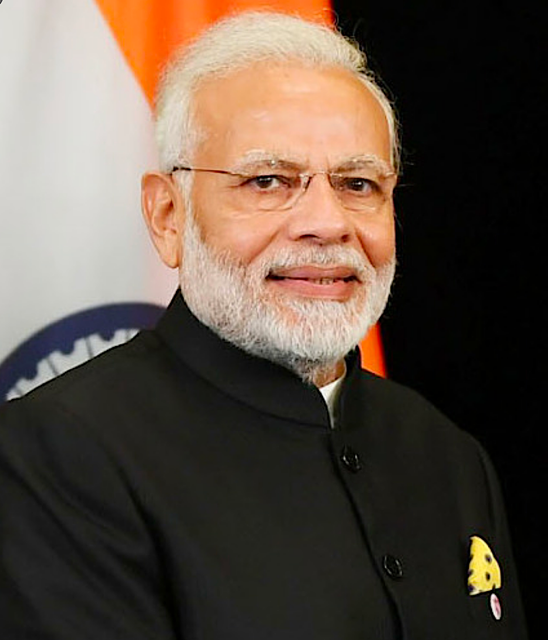
BLOCKING THE FLOW
The trick now must be, it seems, to prevent weapons of mass destruction from falling into the hands of rogue states, unstable leaders and terrorist groups. It’s not easy, but it’s a battle being fought in many western nations, not least the United States, whose Department of Treasury leads the fight. EU member states are playing catch-up, quite successfully, on the whole. France has designated (in other words applied sanctions to) twenty-five companies and individuals allegedly linked to Syria’s chemical weapons programme. They are suspected of being part of two ‘supply networks’ for the Syrian Scientific Studies and Research Centre (SSRC), which has itself been sanctioned repeatedly over the country’s chemical programme.
 Satellite Photos Show Syrian Chemical Weapons Sites Destroyed After U.S.-Led Strikes before and after.
Satellite Photos Show Syrian Chemical Weapons Sites Destroyed After U.S.-Led Strikes before and after.
Many of the firms based in Syria, Lebanon, China and France are linked to the Katranji family. One of those named, Amir Katranji said his blacklisted company has no connection with chemical equipment and supplies. He was named by France, along with his brothers, Houssam and Maher, as well as their company, Electronics Katranji Trading (EKT) and its associate firms, NKTronics and Smart Pegasus, publicly advertised as an import-export company based in Paris. Also listed was EKT Smart Technology, based in China, and Mireille Chahine, originally from Lebanon, who claims to have worked in EKT’s accounts department. A Chinese national, Zhou Yishan, a director of EKT Smart Technology, has also been named, as has Polo Trading, because it was set up by Amir Katranji. EKT Katranji is, however, very much still in the electronics (and other) business and has an address in Beirut, Lebanon. This is the claim on its website: “EKT is a leading retailer and wholesaler of specialist and everyday electronics. Our online shop and showrooms in different countries bring together all the things. Innovative products to make your life easier, technical know-how and first rate customer service.” The very many products on offer include toothbrush sterilizers, computer monitors, laptops, electric drills, hand sanitizer gel and, oddly, Lego. After being blacklisted by France, Katranji told Agence France Presse (AFP) in Beirut “We aren’t doing anything wrong; we reject this announcement,” and he warned that he was appointing a lawyer.
Other entities targeted for sanctions by France include ABC Shipping, also based in Beirut, whose owner, Sami Ballout, strongly denies involvement in helping to develop chemical weapons.
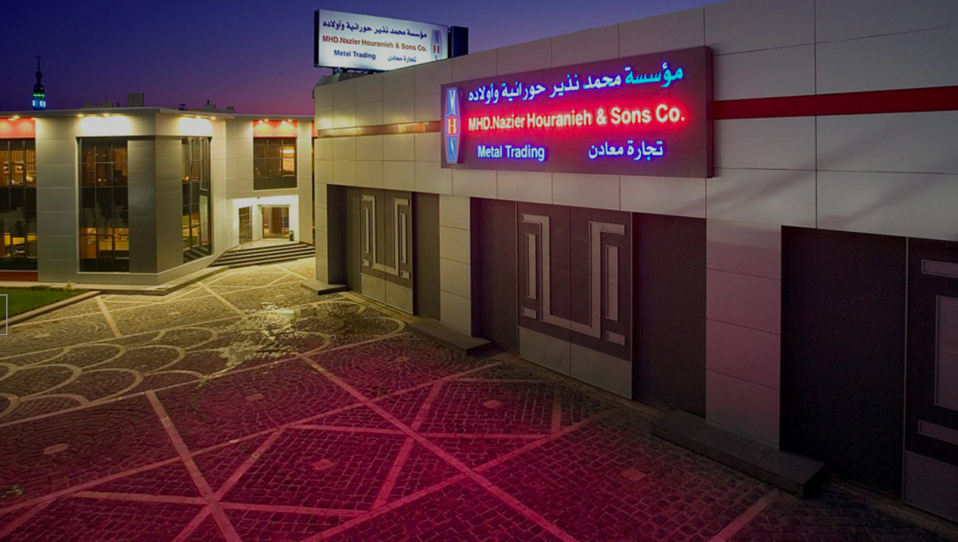 Metal trading company MHD Nazir Houranieh and Sons in Syria
Metal trading company MHD Nazir Houranieh and Sons in Syria
 Ekt Katrangi Facebook promo page
Ekt Katrangi Facebook promo page
Companies based in Damascus were also named, including Golden Star, the MKH Import-Export firm and the metal trading company MHD Nazir Houranieh and Sons, along with five members of the Houranieh family, who OFAC says have “attempted to provide financial, material, technological, or other support for, or goods or services in support of, EKT.” It also conducts business under the name Smart Logistics Offshore and is accused of having helped to facilitate EKT’s operations to the benefit of SSRC. Polo Trading is being designated for being owned or controlled by Amir Katranji, who founded the company in 2013. Also designated were Antoine Ajaka and Anni Beurklian, formerly of Waltham, Massachusetts, “for providing, or attempting to provide, financial, material, technological, or other support for, or goods or services in support of Amir Katranji, including the procurement of U.S.-origin electronic components, which were ultimately destined for Lebanon and Syria.” Both Ajaka and Beurklian fled the United States in 2018.
Furthermore, “Lebanon-based Top Technologies SARL is being designated for being owned or controlled by Ajaka. Top Technologies SARL specializes in the import, export, and sale of network and electronic components.”
France, however, remains pragmatic and willing to upset the administration of President Donald Trump when it suits French interests, especially where the security of its citizens is concerned. For instance, it has controversially agreed a prisoner-swap with Iran, releasing a man French courts had previously agreed to extradite to the United States, where he is wanted for allegedly violating US sanctions. The State Department was furious: “The United States deeply regrets France’s unilateral decision to release Iranian national Jalal Rohollahnejad from its custody. Rohollahnejad was the subject of a U.S. extradition request.

There are multiple outstanding U.S. charges against him related to the illegal export of equipment with military applications in violation of U.S. sanctions. The United States and France have a shared interest in bringing those accused of serious crimes to justice, particularly in cases with national security implications. It is regrettable in this instance that France failed to uphold its treaty obligations and prevented justice from being pursued.” The man whose liberty France secured in exchange for Rohollahnejad is Roland Marchal, a researcher accused of breaching Iran’s security laws. One has to hope it was a worthwhile deal, because Rohollahnejad has links not only with the Iranian military but also, allegedly, with Iran’s Aerospace Industries Organisation (AIO) and Iran’s Ministry of Defence and Armed Forces Logistics (MODAFL), – involved with ballistic missile development – and also with China. It’s where he lived for ten years, gaining a PhD in optical engineering in 2017 from the Huazhong University of Science and Technology in Wuhan. According to Iran Watch, between April 2016 and June 2018, Rohollahnejad allegedly “sought industrial microwave and anti-drone systems from several U.S. firms for Rayan Roshd Afszar, an entity connected to the Islamic Revolutionary Guard Corps (IRGC)”. Rayan Roshd produces components for the IRGC’s drone program, according to the U.S. Department of the Treasury. Rohollahnejad allegedly aimed to disguise the Iranian end-user and destination for these items by using a Chinese pseudonym and declaring the United Arab Emirates (UAE) as the ultimate destination. Payments related to the scheme allegedly totalled about $1 million and involved transfers through several shell companies.”
 Iranian firm Rayan Roshd Afzar © ncr-iran.org
Iranian firm Rayan Roshd Afzar © ncr-iran.org
These are clearly the sorts of claims that would make Washington’s desire to extradite him very understandable. The prisoner exchange sees the release of Marchal, an expert on sub-Saharan conflicts, who had been accused of spreading anti-regime “propaganda against the political system of the Islamic Republic”, while visiting research colleague Fariba Adelkhah, whose dual French-Iranian nationality is not recognised by Tehran, meaning she is (as Marchal was) in an Iranian prison. Both were researchers at the Centre for International Research (CERI) at Sciences Po Paris. The charges against Ms. Adelkhah have been downgraded from espionage but still involve security issues. She remains accused of anti-regime propaganda and “collusion to endanger national security”.
The deal between Paris and Tehran notwithstanding, the US Treasury Department has worked in conjunction with French enforcement agencies to counter attempts at side-stepping anti-proliferation measures, according to Sigal Mandelker, the Treasury’s Under Secretary for Terrorism and Financial Intelligence. “We remain firm in our resolve to counter Syria’s horrific use of chemical weapons, and will continue to take aggressive action against those who supply the SSRC and enhance Syria’s capacity to produce and use chemical weapons.” But Syria, of course, has allies in both Russia and Iran and it was a Russian-made nerve agent, Novichok, that was used in Salisbury, in the United Kingdom, against former spy Sergei Skripal and his daughter Yulia, an action carried out by officers of Russia’s FSB (Russia still denies it) which also killed one UK citizen and seriously harmed another. So blocking access from the West may have little effect: if Syria can’t make the stuff itself it can always get some from Russia, one would imagine. As the saying goes, however, every little helps.
ATOMIC DREAMS
According to the Center for Strategic and International Studies (CSIS), a US-based think tank, “Today, there is a growing recognition that the risks of nuclear weapons just might outweigh their benefits, even for nuclear weapon holders.” It then goes on to explain that: “Three kinds of efforts are required to reduce nuclear risks: Deterring and preventing states and non-state actors from acquiring nuclear weapons; Engaging in nuclear arms control to reduce the threat that nuclear weapons and nuclear material pose worldwide; and building a peaceful nuclear energy fuel cycle that lowers the risk of misuse of nuclear capabilities.” The CSIS has a research programme whose purpose, it says, is clear: “The research of the program is focused on: (1) Developing new tools for slowing proliferation; (2) Identifying next steps in arms control; and (3) Helping illuminate the path toward a sustainable and safe nuclear future.”
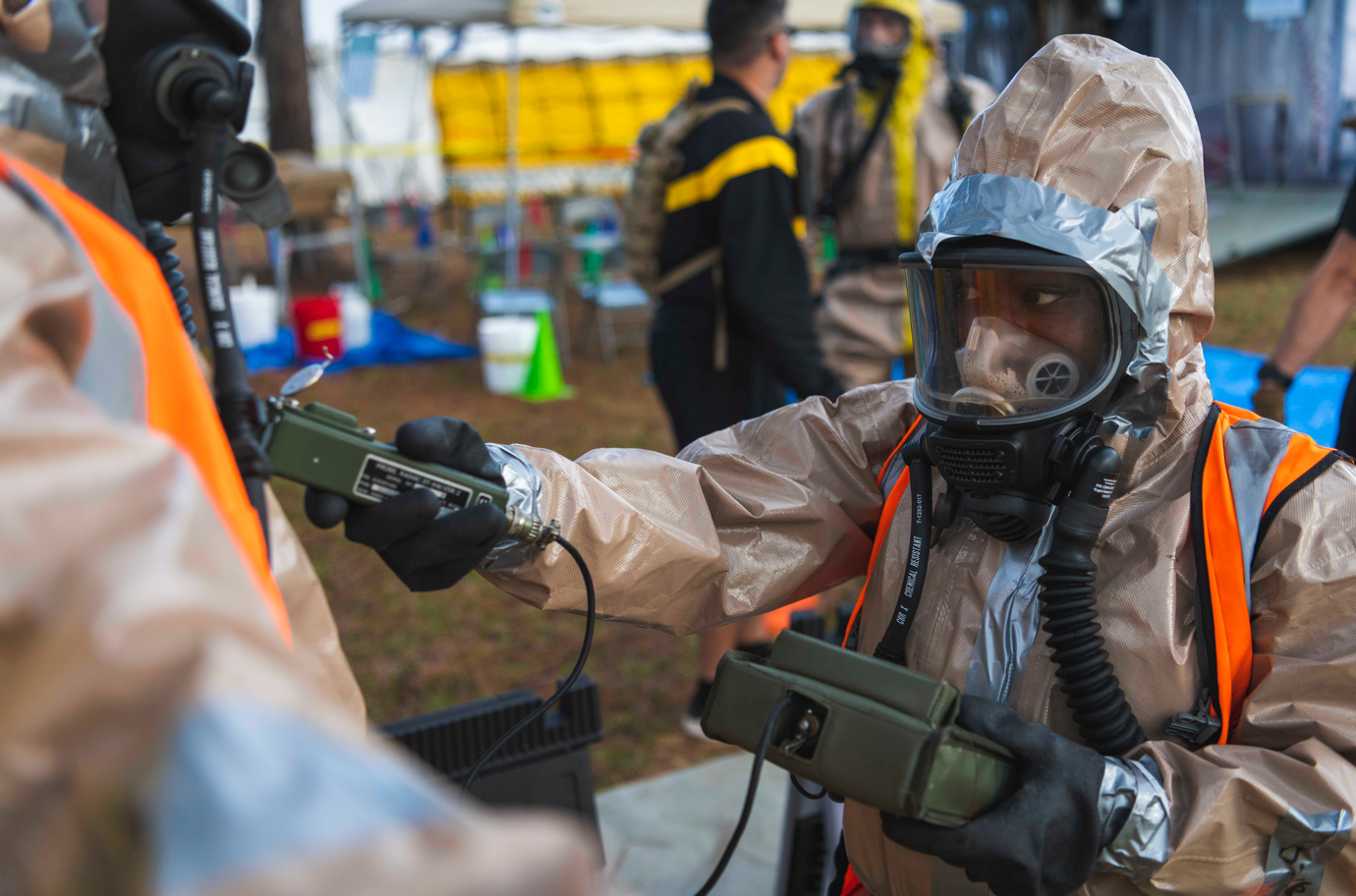 US Service members participate in an emergency response exercise in Starke, Fla to ensure they are operationally capable and prepared to conduct chemical, biological, radiological and nuclear response operations. Photo By: Orion Oettel
US Service members participate in an emergency response exercise in Starke, Fla to ensure they are operationally capable and prepared to conduct chemical, biological, radiological and nuclear response operations. Photo By: Orion Oettel
But nuclear weapons, however devastating, are not the only weapons of mass destruction (WMD) upon which various countries are trying to get their hands. UN Security Council resolution 1540 “identified the proliferation of nuclear, chemical, and biological weapons, their related material, as well as their means of delivery, as a threat to international security,” according to the Stimson Center in Washington, which goes on to explain that the resolution “requires that all States must have and enforce laws and regulations to help prohibit the spread of weapons of mass destruction within or across their borders, complementing and supporting implementation of other non-proliferation treaties, conventions and other resolutions. However, many States struggle to implement these obligations effectively — they lack the capacity or expertise to control the many different materials and technologies that constitute a proliferation risk.”
Those seeking to by-pass the legal controls on proliferation are, of course, well aware of the measures put in place by the US Treasury Department and are looking to find financial support elsewhere. The European Union, a wealthy trading bloc, might be an obvious choice. It, too, has laws to prevent proliferation. The Official Journal of the EU produces annual reports on its progress in “the implementation of the European Union Strategy against the proliferation of weapons of mass destruction (WMD) adopted by the European Council in December 2003”.
Its main body working in this field is the European External Action Service (EEAS), with its office facing along the rue de la Loi, across the Rondpoint Schuman towards the Brussels headquarters of the European Commission on one side of the road and the European Council on the other. It is committed, it says, to “the effective and complementary use of all available instruments and financial resources — the Common Foreign and Security Policy budget, the Instrument contributing to Stability and Peace (IcSP), other instruments — in order to maximise the impact of the EU’s activities in pursuit of its foreign policy objectives.” The problem is that the number of countries trying to acquire WMD increases, along with the agents prepared to find ways around regulations on their behalf, so keeping up with it all takes effort, especially from a multi-country body whose decision-making is inclined to be sclerotic. “In 2008, the EU adopted new lines for action on WMD proliferation,” says the Official Journal. “These were designed to make the 2003 strategy more effective by, for instance, raising awareness in scientific, academic and financial institutions and developing measures to prevent the transfer of knowledge about WMDs to the wrong parties. They reiterate the importance of the 2003 strategy and the principles that determine EU action (effective multilateralism, prevention and international cooperation) and their role in helping implement the United Nations Security Council Resolution 1540.”
Acting through G7, the EU is active in other ways to minimise the risk from WMD. “It is represented in the G7 forum for WMD control – the Non-Proliferation Directors Group – by its Special Envoy for Non-Proliferation and Disarmament,” says the EEAS, “and through the G7, the EU is also part of the Global Partnership against the Spread of Nuclear Weapons and Materials of Mass Destruction, which also includes 17 other donors.” Under the Partnership, the EU has committed almost €1bn, mainly in Russia and Ukraine, to help with dismantling decommissioned nuclear submarines, redirecting former weapons scientists, improving the safety of nuclear installations and decontaminating and converting former chemical weapons production facilities.
The European Council, made up of the appropriate ministers from the EU member states, is ultimately responsible for updating and applying the rules. In October, 2019, they “extended restrictive measures by the EU addressing the use and proliferation of chemical weapons until 16 October 2020.” This was part of ongoing measures originally passed back in 2004, when the problem first became apparent. “These sanctions, which consist of a travel ban to the EU and an asset freeze for persons, as well as an asset freeze for entities, currently apply to nine persons – five linked to the Syrian regime and four involved in the Salisbury attack – and one organisation, the Scientific Studies and Research Centre (SSRC), the Syrian regime’s principal entity for the development of chemical weapons.”
In order to prevent the by-passing of EU laws on financing the acquisition and transportation of sanctioned technology, Italy has made major changes to its laws, as reported by the global law firm DLA Piper: “Among the most important news, it is certainly worth mentioning that the list of addressees of the anti-money laundering obligations set forth by the Decree now includes EU banking and financial intermediaries operating in Italy on a cross-border basis under the freedom to provide services, as well as financial advisers and financial advisor companies referred to, respectively, in Articles 18-bis and 18-ter of the Consolidated Law on Finance.” The new laws are likely to impact unfavourably on gaming and gambling sites, but since gaming service providers are suspected of helping, however unintentionally, to launder dirty money involved in illicit arms transactions anyway, honest providers – in fact, all providers – are being urged to observe their obligations to carry out ‘due diligence’.

The new rules are designed to include virtual currencies – it’s not just the legal tender issued by national treasuries or the European Central Bank but also virtual currencies such as Bitcoin, Etherium and Monero (there are a lot of them, with wildly differing values) “meaning any ‘digital representation of value, not issued by a central bank or by a public authority, not necessarily linked to a currency with legal tender, used as a means of exchange for the purchase of goods and services and transferred, stored and negotiated electronically’.” According to DLA Piper, “the Decree 231 now qualifies as ‘other non-financial operators’ the virtual currency service providers, defined as ‘natural or legal persons providing to third parties, on a professional basis, services functional to use, exchange, store virtual currencies as well as to convert them in or from currencies with legal tender’. Such providers are required to fulfil specific anti-money laundering obligations with regard to virtual currency conversion activities.” The decree, issued in 2018, tries to ensure that it is all-encompassing and that nobody with dishonest intent can slip through the net. DLA Piper again: “Among the most significant innovations, it should be highlighted the creation of a single register of the ultimate beneficial owners of enterprises and trusts. In particular, a special section of the Register of Enterprises will be the tool for collecting and storing information on the beneficial owners of legal persons as well as private legal persons other than companies. The directors of all legal persons are required to provide the register with the relevant information and data. In the event of an inactivity or unjustified refusal by the shareholder to provide the necessary information, the voting rights related to the stakes owned by the beneficial owner will be frozen.” EU countries are determined not to be outfoxed by criminal gangs working for terrorist groups or rogue states, and the European External Action Service wants to be at the forefront of that fight.
CATCHING THE SMUGGLERS
The EEAS continues in its efforts to thwart moves to smuggle illicit materials to supposedly dangerous countries, under the Treaty of the Functioning of the European Union (TFEU).
 The European Union External Action Service (EEAS) in Brussels, Belgium © Wikicommons
The European Union External Action Service (EEAS) in Brussels, Belgium © Wikicommons
According to a report by the EU Anti-Proliferation Consortium, “all regulations of the sanctions regime, including those against the financing of terrorism (the so-called anti-terrorism and Al-Qaeda regulations) and against WMD proliferation financing (currently, the so-called Iran and North Korea regulations) are binding in their entirety and directly applicable in all EU member states, thus taking precedence over national laws.” The targeted measures are aimed not only at freezing assets allegedly involved in banned transactions, but “more importantly, to prevent them from having direct access to their funds and other economic resources in the EU. The nearly 30 regulations of the regime contain, in their respective annexes, comprehensive lists of natural and legal persons as well as other entities subject to the restrictive measures. Currently a total of approximately 5,000 persons or entities are listed on the website of the EU’s European External Action Service (EEAS).”
Returning to the Financial Action Task Force (FATF), it is also helping to unite a variety of nations in trying to stop the spread of WMD. As it says on its website, “To achieve global implementation of the FATF Recommendations, the FATF relies on a strong global network of FATF-Style Regional Bodies (FSRBs), in addition to its own 39 members. The nine FSRBs have an essential role in promoting the effective implementation of the FATF Recommendations by their membership and in providing expertise and input in FATF policy-making. Over 200 jurisdictions around the world have committed to the FATF Recommendations through the global network of FSRBs and FATF memberships.” FATF has the full support of the Council of Europe, too, that association of forty-seven member states that predates the European Union and which tries to ensure compliance with its many conventions through its Committee of Ministers, its Parliamentary Assembly (PACE) and, of course, the European Court of Human Rights. It supports the work of FATF through the Committee of Experts on the Evaluation of Anti-Money Laundering Measures and the Financing of Terrorism.
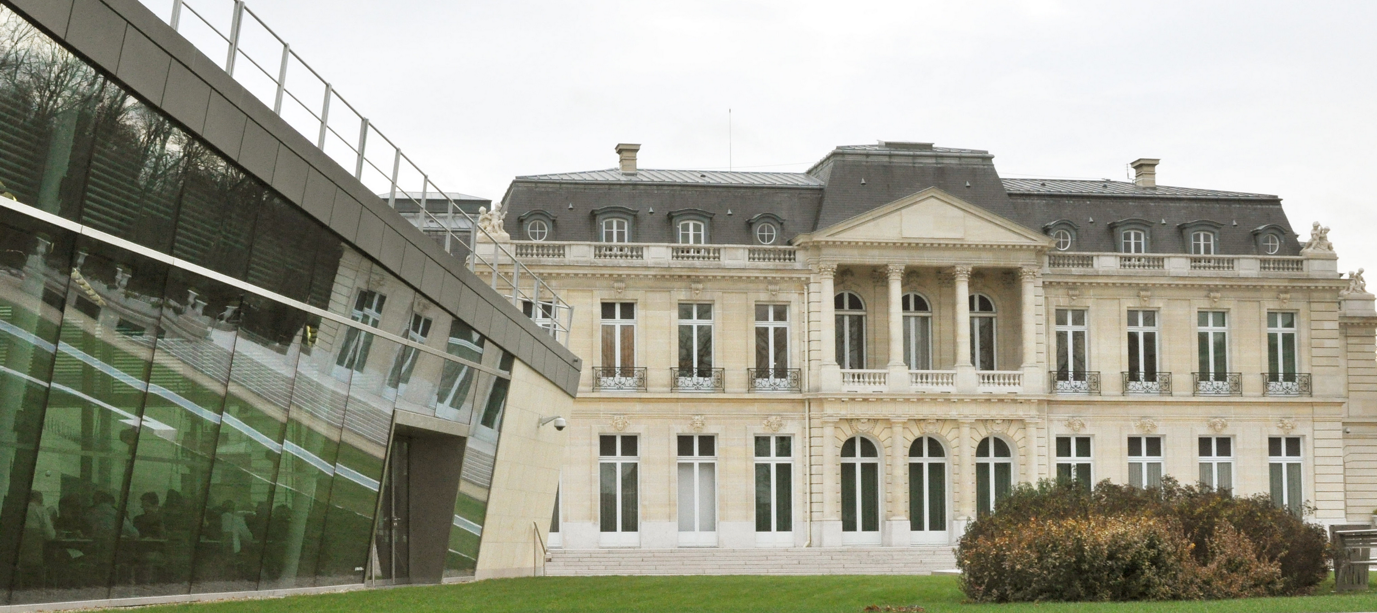 The FATF is located at the Organisation for Economic Co-operation and Development (OECD) headquarters in Paris © Oecd
The FATF is located at the Organisation for Economic Co-operation and Development (OECD) headquarters in Paris © Oecd
There are other ways of trying to prevent proliferation. Take the Los Alamos National Laboratory in the United States, which strives to implement the goals of the US Department of Energy Initiatives for Proliferation Prevention. Its methods are very different from those of the US Treasury: “The mission of the U.S. Department of Energy Initiatives for Proliferation Prevention (IPP) Program is to identify and create commercial opportunities for former weapons scientists currently or formerly involved with weapons of mass destruction in the Former Soviet Union (FSU),” says its website. “IPP currently sponsors 164 projects in Russian at 64 institutes; 16 projects in the Ukraine at 14 institutes; 14 projects in Kazakhstan at 10 institutes; and one project in Belarus. To date, the IPP program has engaged over 10,000 experts in the areas of nuclear, chemical, and biological weapons and missile development at more than 170 institutes in Russia, Kazakhstan, Ukraine, and Belarus.” Eight of the many projects the LANL manages, linking the institutes in those four countries with US partner firms, have been successfully commercialised, generating $17-million (€15.72-million) in annual sales.
START TALKING
President Donald Trump has said he’s keen to open negotiations with the leaders of the other members of the UN Security Council and that talks could begin in September. It’s important for the US, he says, because, over the next ten years,“China seeks to at least double the size of its nuclear stockpile while Russia is developing expensive and destabilizing new types of delivery systems.” He wants a follow-up to the Strategic Arms Reduction Treaty (START). However, China has never been keen on the idea of trilateral talks with the US and Russia. State Department officials recognise this obstacle but remain hopeful. They told the Arms Control Association: “we’re optimistic that it will be possible to engage both with Russia and with China, and to bring those bilateral engagements forward into a trilateral engagement that will ultimately result in the kind of agreement that President Trump has tasked us with trying to come to.” China seems unlikely to play ball, as a Foreign Ministry spokesman reminded journalists in March this year: “China has repeatedly reiterated that it has no intention of participating in the so-called trilateral arms control negotiations with the U.S. and Russia.” Russia has already said it will make no attempts to persuade China. Foreign Minister Sergey Lavrov said “If the Americans are quite sure that it makes no sense to take any further steps on the New START…without China, let them get down to business on this all on their own.”
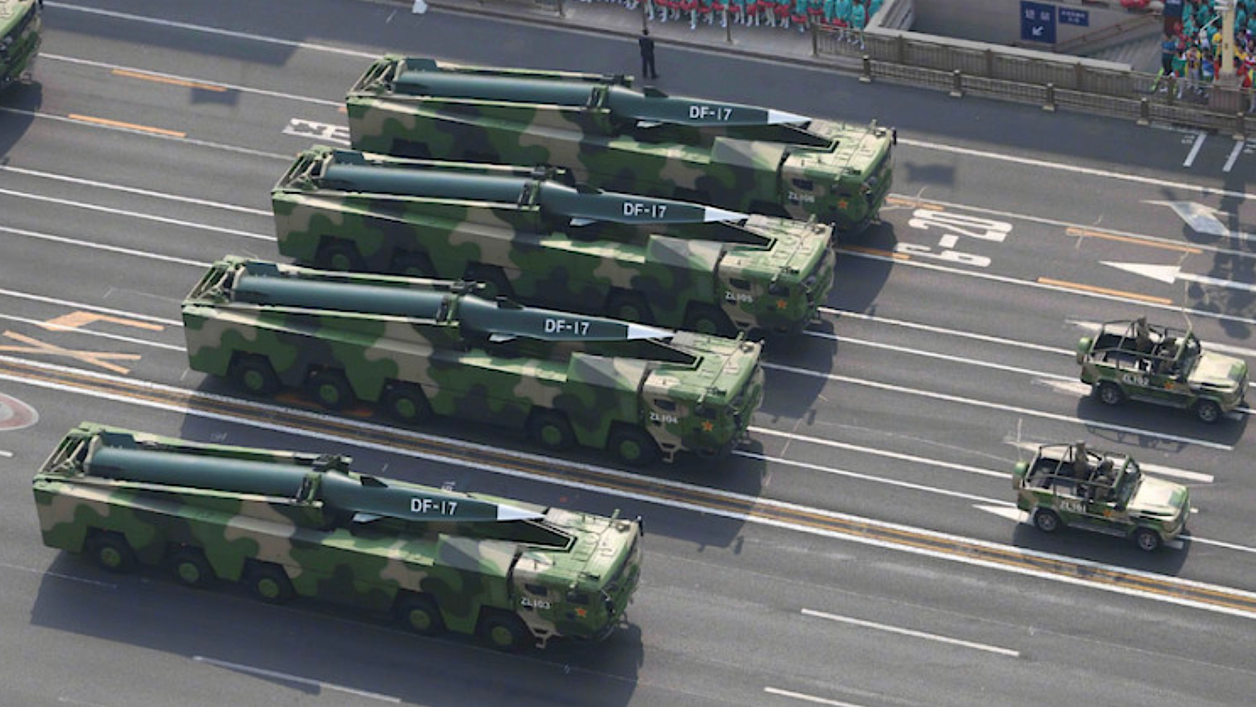 The Dongfeng-17 is a Chinese solid-fuelled road-mobile medium-range ballistic missile that mounts the DF-ZF Hypersonic Glide Vehicle
The Dongfeng-17 is a Chinese solid-fuelled road-mobile medium-range ballistic missile that mounts the DF-ZF Hypersonic Glide Vehicle
France’s President Emmanuel Macron believes a new START treaty is essential and that it must extend beyond 2021. He told a conference in February that uncertainty about its future makes likely a round of “unhindered” military and nuclear competition: an arms race, in other words. His views were echoed by other US allies, including Germany and the United Kingdom. In February, Admiral Charles Richard, commander of U.S. Strategic Command (STRATCOM), told the Senate Armed Services Committee that the “New START treaty has been valuable to this nation and to my command.” He is concerned, however, that the treaty fails to cover every type of nuclear weapon in Russia’s arsenal and that China is not included. “Ultimately a decision to extend the treaty is a political decision,” he said. “I do provide best military advice down the lines of what I just offered to my department to contribute to that.” Admiral Richard told the House Armed Services Committee that he “would love to convince China of the benefits of arms control in general, forget the numbers…I would like to encourage China to understand the benefit of arms control, mutual confidence-building measures, transparency, avoiding miscalculation. That’s what I would like to see added to the table.” No-one is holding his or her breath for such a development, however.
All of this may become merely academic, of course, as the corona virus continues to wreak havoc with international relations, international trade and travel in general. The United Nations Conference on Trade and Development (UNCTAD) is concerned at the paralysis which has gripped the world. “Besides its worrying effects on human life, the novel strain of coronavirus (COVID-19) has the potential to significantly slow down not only the Chinese economy but also the global economy. China has become the central manufacturing hub of many global business operations. Any disruption of China’s output is expected to have repercussions elsewhere through regional and global value chains.” That almost certainly means a disruption in the financing, acquisition and transportation of the parts needed to manufacture WMD. The pandemic, especially as it has affected China, has certainly impacted on less contentious manufacturing procedures, according to UNCTAD: “For example, some European auto manufacturers may face the shortage of critical components for their operations, companies in Japan may find [it] difficult to obtain parts necessary for the assembly of digital cameras, and so on. For many companies, the limited use of inventories brought by a lean and just-in-time manufacturing process would result in shortages that will impact their production capabilities and overall exports.” Bear in mind that this analysis was made before COVID-19 had spread widely outside of China. The situation is now much, much worse. But before anyone comes out with the line that ‘every cloud has a silver lining’ (albeit an extremely tarnished one) do bear in mind this report from Arms Control Today: “The Trump administration is requesting $44.5 billion (€41-billion) in fiscal year 2021 for the Defense and Energy departments to sustain and modernize U.S. nuclear delivery systems and warheads and their supporting infrastructure, an increase of about $7.3 billion (€6.74-billion), or 19 percent, from the fiscal year 2020 level….This includes $28.9 billion (€26.7-billion) for the Pentagon and $15.6 billion (€14.4-billion) for the Energy Department.” The race for ever-bigger, ever-more-deadly weapons continues.
The way things are going, of course, while we may all escape the deadly effects of WMD in the hands of dangerous idiots, many of us may not escape the corona virus. It has yet to be tamed and it seems to be avoiding many of the hastily-erected barriers to its progress in its triumphant march around the globe. Daryl J. Kimball of the Arms Control Association points out in the April edition of Arms Control Today that governments have been warned for decades of the risk from global threats like pandemics but instead they spent their money on WMD and the means to deliver them. “The US government,” he writes, “spends tens of billions of taxpayer dollars to maintain a massive nuclear arsenal capable of destroying the planet many times over. Meanwhile, it does not have a stockpile of masks large enough to protect front-line health care workers who are battling COVID-19.”
In most places, “social distancing” is recommended, in the hope that a 2-metre gap between people will slow it down, although the SARS-COV-2 virus has so far traversed tens of thousands of kilometres to infect and kill thousands of people in almost 200 countries. What those rogue states and terrorist groups would do to acquire a weapon that could achieve so much global death and destruction we can only speculate.
Tobias Bowman-Grant
Click here to read the 2020 May edition of Europe Diplomatic Magazine


